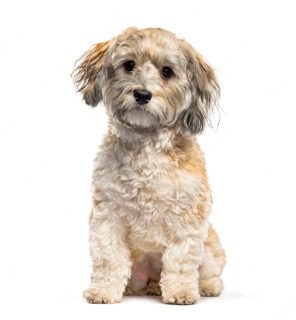
The Havanese is a small and friendly companion dog that originated in Cuba. Havanese are believed to be a combination of breeds used in Cuba including the Blanquito, Bichon Tenerife and others. They were bred to be a companion and lap dog, and today make loving and loyal companions for all types of owners.
The Havanese is a very small, distinctively and strongly built breed with a long and silky double fur coat. Their coat can come in a variety of colors, such as apricot, cream, black, brown, white, silver and blue. They may have a body that seems square in proportion, and have a long, wooly looking fur on their underside. The head is medium sized and slightly rounded with dark, round eyes that are set wide apart, and slightly rounded folded ears that can be either trimmed or left natural. The legs are long and slim, and tail is long with the fur being slightly flipped.
The Havanese is a very special breed. Their friendly personality, combined with a thick, long draping coat make them an attractive companion, as well as showing judges. They are also know for their intelligence, and are adept at learning tricks quickly. They are often hypoallergenic and low-shedding, making them a great pet for anyone with allergies or those who want to avoid cleaning up fur.
The Havanese is a friendly and gentle breed that loves people. Their intelligence and playful nature make them easy to train and perfect for families with children. They are very patient and tolerant, and get along well with other dogs and household pets. Early training and socialization is important for this breed, as it will make them easier to manage. Exercise and activity needs should be taken into account; the Havanese needs a moderate amount of exercise on a daily basis. Although they have energy, they rarely bark and can be kept inside. Activities such as daily walks, playtime, and runs should be included in their lifestyle to keep them happy and healthy. Due to their intelligence and gentle nature, they form strong bonds with their owners.
The Havanese is an intelligent, outgoing, and friendly companion breed. They can have a tendency to gain weight, so regular exercise and a nutritionally complete diet are important to maintain their health. This breed does well with a combination of wet and dry food, but always look for high-quality foods with whole food ingredients so your pup gets the best nutrition. Responsible ownership of this breed includes providing them with a nutritious diet to meet their energy requirements. Eating healthy meals composed of proteins, grains, essential fatty acids, and other nutrients helps them maintain their energy level and overall vitality. It is also important to ensure that the Havanese gets all the nutrients they need to stay healthy as puppies and adults. A balanced diet with calcium, vitamins, and minerals will help promote their growth and development. Havanese owners should also take into account the dog’s size and activity level when feeding, giving a larger meal to a more active dog. If feeding store-bought food, ensure that it meets the nutritional requirements outlined for Havanese puppies and adults. For more information regarding this breed’s nutritional needs and feeding guidelines, the reader is encouraged to check out Way Canina. There they will find invaluable information and resources to help ensure their pup stays in the best of health.
The Havanese is a small breed of dog that is known for being lively, loving, and intelligent. They have a typical lifespan of 10-15 years and a few common health issues such as patellar luxation and Legg-Calve-Perthes disease. Regular veterinary check-ups, vaccinations, and preventive care are important in keeping your pet healthy and allowing them to reach their full lifespan. Their coat needs regular grooming including brushing, bathing, and ear cleaning. Exercise, feeding a nutritionally balanced diet, and providing adequate mental stimulation can help to extend their lifespan and keep them comfortable. Regular health checkups with your vet can reveal any underlying potential health issues.
Are you currently the proud owner of a Havanese or are you considering adding one to your family? Owning a Havanese comes with many responsibilities, so we recommend researching them beforehand in order to make the best decision. Check out our blog posts and articles on Way Canina to compare different breeds and find additional information about dogs’ lifestyles and wellbeing.